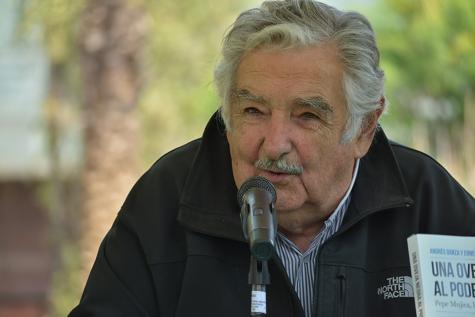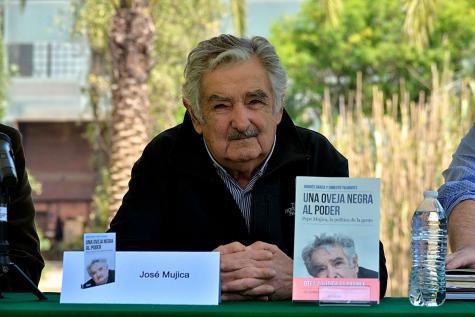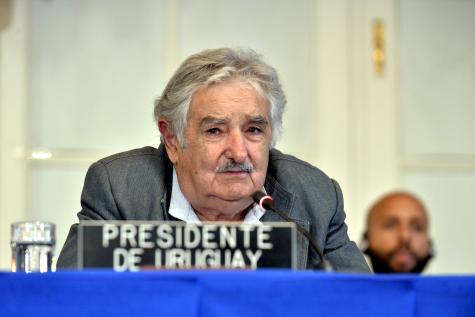Jose Mujica (Uruguay)

➡️ JOSÉ MUJICA - Former President of Uruguay (1935 – 2025)
Affectionately referred to as "Pepe", the former President of Uruguay was famed for his humble lifestyle and progressive policies. Serving from 2010 to 2015, Mujica donated 90% of his presidential salary to charities. In just five years as president, he earned respect and admiration for his progressive approach to politics and power.
"Politics is the fight for happiness for all" - José Mujica
Jump straight to our links on ➡️ José Mujica
Before transitioning into politics, Mujica spent over a decade in prison, where he became a symbol of resilience and integrity. He famously lived on a modest farm and drove an old Volkswagen Beetle, reflecting his commitment to equality and social justice.
His authenticity bolstered his image as a leader for the people who genuinely cared for the welfare of his country. His popularity gave him credibility and boosted his effectiveness in governance, allowing him to implement radical reforms.

What Were José Mujica's Major Policies?
Mujica championed social equality and economic inclusivity by expanding welfare programmes, legalising abortion, opening borders to Syrian refugees, and increasing the minimum wage. One of his most notable achievements was the legalisation of same-sex marriage in 2013, making Uruguay one of the first Latin American countries to do so.
He implemented a groundbreaking policy which legalised the production and sale of marijuana under state control, to combat drug trafficking and related violence. Focused on social equality, Mujica also made significant educational and healthcare reforms.
His government prioritised renewable energy, boosting the proportion of Uruguay's electricity generated from renewable sources to over 90%. Prioritising energy independence and sustainability led to substantial investments in wind, solar, and biomass energy.
By the end of his term, the transition had reduced the country's carbon footprint, lowered energy costs, and increased energy security. Uruguay's rate of electricity generation from renewables is now 98%, one of the highest in the world.
His legacy of social reform set a positive example for politicians in Latin America and around the world. Uruguay began building its reputation as a forward-thinking and socially responsible nation.

Jose Mujica the Guerrilla Fighter
Before entering mainstream politics, José Mujica was a member of the Tupamaros, a leftist guerrilla group that sought to overthrow the Uruguayan government in the 1960s and 70s. He spent more than 10 years in prison, enduring harsh conditions, including solitary confinement.
On his release, his firsthand experience of oppression and injustice led him to embrace democracy as a means to achieve social change and advocate for peace, social justice, and democratic rule.
Often referred to as "the world's poorest president", Mujica continued to be active in politics after his presidency as a national senator until 2018. Through his presence on social media and many talks, he won a wide following among young Latin Americans who admired his progressive principles and commitment to a simple life.
Author: Rachael Mellor, 21.05.25 licensed under CC BY-SA 4.0
For further reading on José Mujica see below ⬇️
- YouTube153041
- José Mujica - Wikipedia 470101
- Presidency of José Mujica - Wikipedia470106
- Same-sex marriage in Uruguay - Wikipedia470113
- Abortion in Uruguay - Wikipedia470119
- Cannabis in Uruguay - Wikipedia470123
- Tupamaros - Wikipedia470149
- Twitter - #Mujica153044
- Facebook - Mujica Heroe (fan page)153045
- BBC - Jose Mujica477071
- Jose Mujica - The Conversation477076
- Southern Consciousness with Pepe Mujica - DW477075
- Book: José 'Pepe' Mujica: Warrior Philosopher President - Stephen Gregory, 2021473426
- El Pepe: How José Mujica Charmed, Fooled, And Shaped A Nation - Eurasia Review 26.05.25471052
- José Mujica’s Latin America: The Dream, The Struggle, The Legacy - Peoples Democracy 25.05.25471053
- José Mujica: Guerilla, president and occasional romantic - BBC 25.05.25471055
- Power Lies in the Heart - Rosa Luxemburg Stiftung 22.05.25471054
- Pepe Mujica: From political prisoner to Uruguayan president - Radio Free 20.05.25471056
- My Afternoon with José Mujica - Progressive 18.05.25470341
- José “Pepe” Mujica: The revolutionary who never surrendered his ideals - Peoples Dispatch 18.05.25470340
- Corporate media casts ex-Uruguayan president and former guerrilla José Mujica as secular saint - WSWS 18.05.25471043
- Pepe Mujica's long revolution - New Yorker 16.05.25 470102
- Video: ‘Farewell Pepe’: Uruguay mourns former president José Mujica - Euronews 15.05.25469238
- ‘Pepe’ Mujica and politics as tool for transformation - BA Times 15.05.25470103
- José Mujica, Uruguyan Marxist guerrilla who later became ‘the world’s poorest president’ - The Telegraph 15.05.25469239
- Mourners from all corners of Uruguay bid farewell to iconic former President José Mujica - Washington Post 15.05.25469240
- The environmental legacy of José “Pepe” Mujica: “We are devouring life” - Noticias Ambientales 14.05.25470108
- Pepe Mujica: My Generation Made a Naive Error - Jacobin 14.05.25470158
- José “El Pepe” Mujica became the antithesis of a caudillo - The Economist 14.04.25469237
- From a Tin-Roof Shack, Pepe Mujica Removed the Pomp from Politics - NYT 14.05.25469084
- José ‘Pepe’ Mujica obituary - Guardian 14.05.25468926
- Latin American left bids farewell to Pepe Mujica: ‘We’ll miss you very much, dear old man’ - El Pais 14.05.25469083
- Video: Latin America pays tribute to Uruguay's Mujica, world's 'poorest president' - France24 13.05.25469081
- Video: Jose Mujica, Uruguay’s former president and ‘world’s humblest leader’, dies at 89 - Al Jazeera 13.05.25469082
- José ‘Pepe’ Mujica, former guerrilla and ex-president of Uruguay, dies aged 89 - Guardian 13.05.25468927
- Latin America in Mourning: International Figures Pay Tribute to Pepe Mujica - Tele SUR 13.05.25468933
- Uruguay's José Mujica, world's 'poorest president', dies - BBC 13.05.25468931
- Cuban President Pays Tribute to the “Extraordinary Life” of José Mujica, Symbol of Latin American Left - Tele SUR 13.05.25468934
- 'Pepe' Mujica, the Tupamaro who became president of Uruguay and an icon of Latin America - France24 13.05.25477077
- Uruguay's ex-president Jose Mujica, leftist icon and cannabis reformer, dies at 89 - France24 13.05.25468930
- Going for Green: Uruguay’s Renewable Energy Revolution - The Nation 13.03.25470104
- Pepe Mujica Says Goodbye to His Comrades - Tele SUR 09.01.25468935
- Uruguay’s popular former president José Mujica reveals he is dying of cancer - Guardian 09.01.25468928
- Documentary: José Mujica - Life in a globalized world - DW, 2025470155
- Book: Surviving the 21st Century - Noam Chomsky, José Mujica, 2025470153
- José Mujica, the former president with an austere lifestyle that changed Uruguay, dies at 89. - LA Times 13.05.25477079
- José ‘Pepe’ Mujica: ‘I dedicated myself to changing the world and I didn’t change a damn thing’ - El Pais 23.11.24470148
- Pepe Mujica: Reflections on Global Conflict, Latin American Unity, and the Power of Simplicity - Znet 18.10.24468932
- Former President Pepe Mujica: “Nicaragua and Venezuela Are Indefensible” - Confidencial 12.10.24470160
- Two Armed Rebels Who Led a Nation: A Love Story - NY Times 23.08.24470150
- What Uruguay Can Teach Us - Americas Quarterly 31.01.23470159
- Pepe Mujica favors legalizing drugs to hurt traffickers - Merco Press 19.07.22470125
- José ‘Pepe’ Mujica: ‘It’s one thing to be passionate and convinced of what you’re defending and another thing to fall into fanaticism’ - BA Times 22.10.21470107
- Book: Jose Pepe Mujica : Warrior, Philosopher, President - Gregory, Stephen, 2021470152
- Uruguay, Latin America’s Renewable Champion - Energy Transition 27.01.20470109
- Documentary: El Pepe, a Supreme Life, 2018470154
- Documentary: El Pepe, una vida suprema, 2018470156
- Uruguay says more Syrian refugees welcome - Rudaw 21.07.15470147
- 8 reasons why we'll miss Jose Mujica, Uruguay's maverick president - Independent 3/15153046
- Jose Mujica Was Every Liberal's Dream President. He Was Too Good to Be True - TNR 06.02.15470105
- Jose Mujica Was Every Liberal's Dream President. He Was Too Good to Be True. - New Republic 2/15153049
- President Mujica’s social revolution - France24 17.10.14470114
- Uruguay receives first group of Syrian refugees - BBC 09.10.14470143
- Tiny Uruguay plays big role in Syria refugee crisis - USA today 09.10.14470146
- José Mujica: is this the world’s most radical president? - Guardian 18.09.14470135
- Uruguay’s renewable energy revolution - El Pais 11.07.14470112
- Uruguay’s Mujica: New global role model? - Al Jazeera 08.06.14470141
- Uruguay's José Mujica: the 'humble' leader with grand ideas - Guardian 27.05.14468929
- The World's Most Humble President Just Opened His House to 100 Syrian Refugee Children - MIC 22.05.14470145
- Podcast – Uruguay’s President José Mujica - Vice 12.05.14470140
- Syrian refugees in Uruguay - DW 06.04.14470144
- Uruguay President Jose Mujica urges US and Europe to change drug policy - Telegraph 14.02.14470139
- As Uruguay moves to legalise cannabis, is the ‘war on drugs’ finished? - Metro 20.01.14470133
- Documentary: Pepe Mujica - Lessons from the Flowerbed, 2014470157
- Uruguay Opts Out of the War on Drugs - KCRW 13.12.13470142
- Uruguay bill pioneers state control of cannabis market - BBC 11.12.13470124
- Uruguay's likely cannabis law could set tone for war on drugs in Latin America - Guardian 18.11.13470138
- Jose Mujica: 'I earn more than I need' - Al Jazeera 10/13153050
- Jose Pepe Mujica,President of Uruguay in UN Speech with English Translation 2013 - 9/13153051
- Histórico discurso de José Mujica En la ONU contra el orden mundial 2014 (FULL HD) 9/13153054
- Same-sex marriage bill comes into force in Uruguay - BBC 05.08.13470115
- Uruguay MPs back marijuana legalisation bill - BBC 01.08.13470122
- Uruguay’s Equal Marriage Act a step towards full equality in the Americas - Amnesty 12.04.13470117
- Uruguay votes to legalise gay marriage - Al Jazeera 11.04.13470116
- Jose Mujica: The world's 'poorest' president - BBC 15.11.12470111
- Uruguay Senate Approves First-Trimester Abortions - NY Times 18.10.12470121
- Uruguay legalises abortion - BBC 17.10.12470118
- Uruguay set to legalise abortion - Guardian 25.09.12470120
- Documentary: Tupamaros, 1997470151
- La ONU elogia al expresidente de Uruguay Pepe Mujica, el “líder humilde” comprometido con la justicia social - UN 14.05.25477078